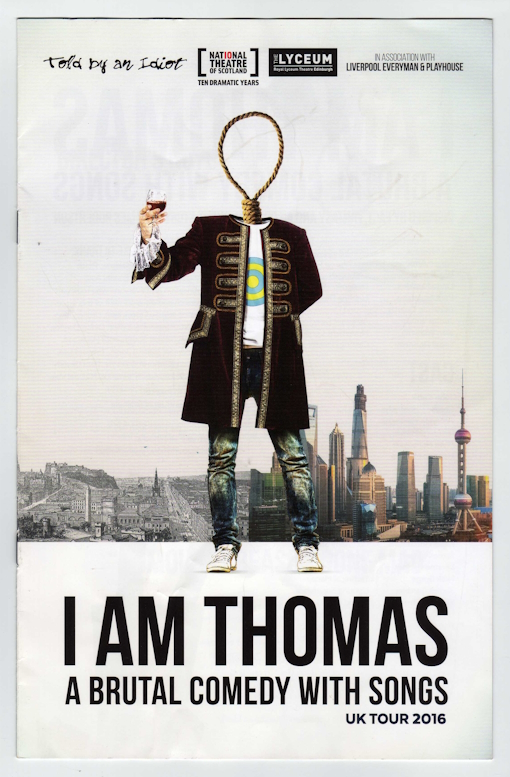I Am Thomas reviewed at Liverpool Playhouse
I Am Thomas is a play created by the theatre company, Told By An Idiot. This review is based on its run at Liverpool Playhouse from 19-27 February 2016.

In the week that my jaw plummeted in a southerly direction due to unexpected use of the phrase ‘zipless fuck’ on Radio 4 – at 10.45am no less – you might think there’s nowhere left for transgressive discourse to go. Alas, the brutal silencing of French cartoonists and the current creeping censoriousness on university campuses close to home both indicate that certain kinds of speech remain far from free.
This theme lies at the heart of I Am Thomas, a ‘brutal comedy with songs’ that opened at Liverpool Playhouse this week. Directed by Paul Hunter and produced by Told By An Idiot together with the National Theatre of Scotland and Edinburgh’s Royal Lyceum, the show is powered by a forgotten historical fact: it unearths the story of Thomas Aikenhead, the last person in Britain to be executed for blasphemy. It presents his tale as a Brechtian dissection of the right to abuse accepted wisdoms and to speak a personal kind of truth.
With song lyrics by Simon Armitage, a trio of respected production companies, and some truly dark late-17th-century history to play with, I expected a lot from this show. I wanted big laughs and visceral sensations, and for received ideas to be mercilessly lampooned. After all, according to Aikenhead’s blasphemy indictment, the doomed man himself “rejected the mystery of the Trinity as unworthy of refutation; and scoffed at the incarnation of Christ”. That was damnable stuff in 1697, and still pretty potent considering the possible consequences of mocking religion today.
The first ten minutes promise plenty of irreverent fun, with a gathering of Edinburgh’s current great and good attempting to decide which historical city figure should be honoured with a statue. Dolly the Sheep is one suggestion; legendary Scottish footballer Archie Gemmill is another. But when Thomas Aikenhead’s name is raised, the response is a full-throttle production number which would appear to be called ‘Who the Fuck Are You?’. As someone who almost always finds swearing to be both big and clever, I have no hesitation in recommending this as a great start to a musical.
The rest of the show is an answer to this robustly-phrased question as the company set out to tell us who the fuck Thomas Aikenhead was. However, instead of settling for a conventional telling of the story, his biography is woven in and out of a pantomime vision of 1970s(ish) Edinburgh – a world in which secret agents stalk open mic nights listening out for indiscretions, and the Sex Pistols’ album Never Mind the Bollocks is likened to the historical Aikenhead’s unthinkable thoughts. The implication, I imagine, is that we are all potential blasphemers in one way or another, and perhaps recent times are not so different from Scotland in 1697.
This show is meant to be funny. In fact it looks as though it’s meant to be very funny. You can tell by the number of comedy wigs, quick changes and the furious invention with props and scenery – an approach that worked wonderfully well up at the Everyman not long ago with Kneehigh’s Dead Dog in a Suitcase. In fact that show’s lead, Dominic Marsh, appears here too in a variety of roles including Aikenhead’s chief prosecutor, John Stewart.
This time, however, the material grows increasingly weak as the show proceeds. Instead of locking on to its thematic target and delivering a payload of explosive laughter and pitch-black moods, it confuses surrealism with randomness, showering the show with out-of-context movie quotes, ragged comedy routines, pop culture references, and gags so laboured that even a smirk is too much to manage. For instance, there’s a recurring Match of the Day spoof that’s moderately amusing first time round, but by the fourth outing I was yearning for the ref’s whistle to blow.
Aikenhead’s history could be a powerful tale, but here it is undermined at almost every turn, not least by the fact that virtually every member of the cast has a go at playing the lead. With stronger material, this might have worked; faced with a stage full of ‘I am Thomas’ t-shirts, you can’t help but be reminded of ‘I’m Spartacus’ or, more poignantly, ‘Je suis Charlie’. But unfortunately it also means that Aikenhead never becomes a character we can engage with. He remains a two-dimensional template for ideas that never fully fly free, and instead of Brechtian alienation I found myself suffering from Wednesday night boredom, plain and simple.
Despite all this, there are pleasures to be had in I Am Thomas. Simon Armitage’s lyrics are witty and dark, while Iain Johnstone’s music can swoop from 1970s balladeering to music hall knees-up to what sounds like Slavic folk. Myra McFadyen has a strong stage presence, particularly in her Bay City Rollers get-up as she pals around with the 20th-century version of Aikenhead, and the cast generally do what they can with the material at hand.
But there’s no getting away from the fact that I Am Thomas doesn’t pack the punch that its subject matter promises. Whether Edinburgh gets its statue of this forgotten historical figure, you’ll have to see the show to find out. But I’m afraid that whether or not he finally gets cast in bronze and preserved for posterity on a plinth, this production is far from being the commemoration that this real-life free-speech hero deserves.
I Am Thomas ran at Liverpool Playhouse from 19-27 February 2016.
This review originally appeared on the website Northern Soul.
© Damon Fairclough 2016
Share this article
Follow me